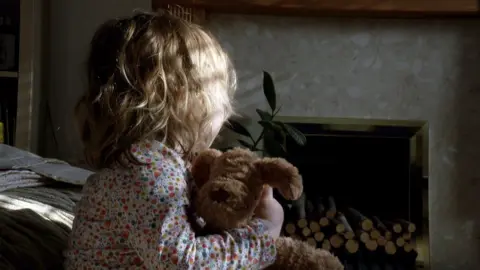Family courts: 'Major overhaul' aims to protect domestic abuse victims
 BBC
BBCDomestic abuse victims will get greater protections in an "overhaul of how the family courts deal with the horrific crime", the government has announced.
Under new plans, more victims will have access to separate courtroom entrances, waiting rooms and protective screens to shield them from their alleged abuser.
A number of reforms will be included in the upcoming Domestic Abuse Bill.
It comes after an expert-led review of the family courts' handling domestic abuse, following a BBC investigation.
Research by the Victoria Derbyshire programme found that within five years at least four children were killed by a parent with a known history of domestic abuse after a family court granted access.
The BBC also learned of cases where a parent with convictions for serious crimes relating to domestic abuse - including rape and serious violent offences - were granted unsupervised access to their child.
The government review, led by experts from charities, the judiciary, family law practitioners and academia, took the views of more than 1,200 organisations and individuals, including parents and children with experience of the family courts.
It heard concerns about a "pro-contact culture", in which courts placed undue priority on ensuring contact with the non-resident parent, resulting in "systemic minimisation of allegations of domestic abuse".
The panel heard evidence about potential long-term harm to children as a result of courts ordering continued contact with an abusive parent.
It also found that an "adversarial system" in the family courts, including in cases involving child sexual abuse, often worsened conflict between parents and could re-traumatise victims and their children.
"Sweeping reforms" of the system aimed to better protect domestic abuse victims in the family courts, the Ministry of Justice said.
They include:
- Automatic entitlement to separate waiting rooms, entrances and screens in court for victims of domestic abuse, to be included in the upcoming Domestic Abuse Bill
- More powers for judges in the form of "barring orders" to prevent abusers repeatedly dragging ex-partners back to court and re-traumatising victims
- A review of the presumption of "parental involvement" and the balance between risk of harm to children and victims, and the right of the child to have a relationship with both parents
- A trial of a new domestic abuse court with a "problem-solving approach" where a judge explores evidence rather than parents presenting their cases against each other
- A commitment to improved training for professionals in the family justice system
'Step forward'
Justice minister Alex Chalk said the family courts see some of the most vulnerable in society and the government had a duty "to ensure they are protected and not put in danger".
"This report lays bare many hard truths about long-standing failings, but we are determined to drive the fundamental change necessary to keep victims and their children safe," he said.
Nicki Norman, Acting CEO at the charity Women's Aid, who was a member of the expert panel, said the report marked "a major step forward".
She said that "all too often, survivors and their children experience the family courts as failing to effectively protect them".
"This welcome report must now deliver change."
Domestic Abuse Commissioner Nicole Jacobs and Victims' Commissioner for England and Wales Dame Vera Baird QC also welcomed the reforms.
"This panel of experts has dug deep to understand, and address, the serious harm to domestic abuse victims and their children caused over many years by the presumption of contact, and the intensely adversarial process present in the family courts," Dame Vera said.
Top family court judge in England and Wales, Sir Andrew McFarlance, President of the Family Division, praised the review, and said he hoped parliament would be able to allocate the resources necessary to implement the proposals.
The Domestic Abuse Bill is currently at the report stage in the House of Commons. Other measures include prohibiting perpetrators of abuse from cross-examining their victims in person in the family courts in England and Wales.